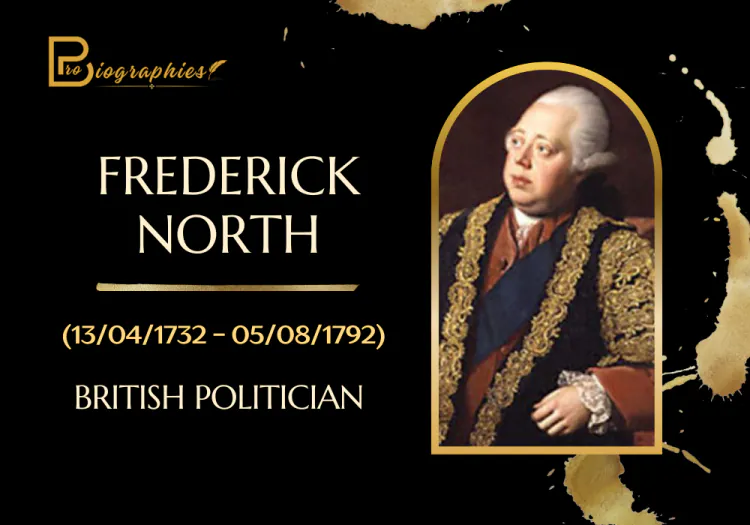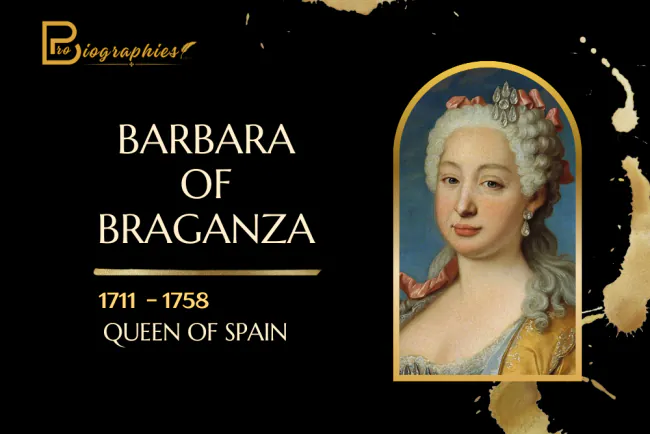Frederick North Biography
British politician & Prime Minister of Great Britain from 1770 to 1782.

| Name | Frederick North |
| Parents | Lady Lucy Montagu and Francis North |
| Political party | Whig (1754-1770), Conservative (1770–1790) |
| Titles | Lord North, Earl of Guilford |
| Spouse | Anne Speke |
| Children | George Augustus, Catherine Anne, Francis, Lady Anne, Frederick, Lady Charlotte, Dudley |
London-born Frederick North, popularly known as Lord North, was born on April 13th, 1732.
Family:
Francis North, 1st Earl of Guildford and Lady Lucy Montagu gave birth to him being their second son. Being a part of the British aristocracy he belonged to a privileged class.
Education:
Eton College admitted him between 1742 and 1748. He was awarded a law degree from Trinity College in Oxford after that.
Political Career of Frederick North :
Frederick commenced his political career when he became an MP for Banbury in 1754 which he held till death. His skills in debating and understanding of affairs of state enabled him to rise rapidly within the British government.
First Paymaster of the Forces before becoming Chancellor of the Exchequer in 1767. The influence of mentors such as William Pitt the Elder – who helped him understand how British politics worked – was highly visible during his political career.
Prime Minister:
Frederick served as Prime Minister from 1770 until 1782 when his party fell from power. Some challenges he had to deal with include financial issues and mounting tensions with American colonies. Many economic policies were implemented by him at the time to reduce national debt concerns.
At the time of the Falklands Crisis in 1770, his government had initial success in confronting a Spanish attempt to capture the islands which almost led to war. Spain, with support from France, had occupied a British colony on the islands, but King Louis XV of France who did not want to go to war came in and that made Spain withdraw. This incident greatly increased the prestige and popularity of the British government, proving the power of the Royal Navy.
American War of Independence:
For most of Lord North's tenure as Prime Minister, he initially focused on resolving growing conflicts with America’s colonies and then on overseeing American Revolutionary War which began with Battle at Lexington in 1775. After Boston Tea Party (1773), North proposed Coercive Acts or Intolerable Acts as they were known in America by punishing measures for Bostonians. These acts included closure of Boston harbor and various trade restrictions that were put up to keep peace and check wayward colonists but instead heightened tensions leading to open warfare.
In-spite-of some British victories such as New York capture and Philadelphia occupation; intervention by French forces in 1778 followed by Spaniards alongside Dutch Republic complicated it turning conflict into global war with no allies for Britain. From thereon, Britain concentrated its efforts on defending West Indies famous for their sugar plantations. The domestic issues like labor shortage and discontent triggered by Catholic Relief Act resulted into Gordon Riots (1780).
British Surrender at Yorktown:
Though some other military successes occurred later, surrender at Yorktown was a negative turning point for Britain in 1781. News about this defeat left North shaken who subsequently resigned after losing no confidence motion on March 1782 becoming second ever British Prime Minister removed this way. The war had begun to turn against Britain by 1782 but North criticized terms of peace agreed by subsequent governments which he thought were unfavorable.
The Fox-North Coalition and the Treaty of Paris:
In April 1783, he came back to power as Home Secretary in a surprise coalition with radical Whig leader Charles James Fox. This alliance was known as the Fox-North Coalition, something that King George III considered betrayal. Consequently, North never held government office again after this ministry collapsed in December 1783. One of the most significant achievements for this coalition was signing Treaty of Paris that effectively ended American Revolutionary War.
Private life:
Frederick married Anne Spekee on 20 May 1756, and they had children namely George Augustus the third Earl of Guilford, Catherine Anne, Francis the fourth Earl of Guilford, Lady Anne, Frederick the fifth Earl of Guilford, Lady Charlotte and Dudley.
Death:
He died in London on August 5, 1792. He was buried in Wroxton; Oxfordshire. His sculpture was carved by John Flaxman.
Legacy:
Although his reputation suffered because of American independence he eventually became recognised as a capable politician under extremely difficult conditions. Mostly known for being blamed for loss of American colonies which is seen as the main point in his history but he also made contributions towards financial policy and effective public administration.
Summary:
This British politician served as Prime Minister from 1770 to 1782. For him, his political career was characterized by handling American war of independence crisis that eventually led to Great Britain losing its American colonies. Despite efforts to reach peaceful resolutions, his government received widespread criticism regarding its conduct during this period.
Did you know...
He took office as the second youngest prime minister ever and stayed in power longer than almost any other British leader.
Charges
- Paymaster of the Forces
1766–1767 - Chancellor of the Exchequer
1767–1782 - Leader of the House of Commons
1767–1782 - Prime Minister of Great Britain
1770–1782 - First Lord of the Treasury
1770–1782 - Home Secretary
1783 - Leader of the House of Commons
1783 - Member of Parliament for Banbury
1754–1790
What's Your Reaction?





























